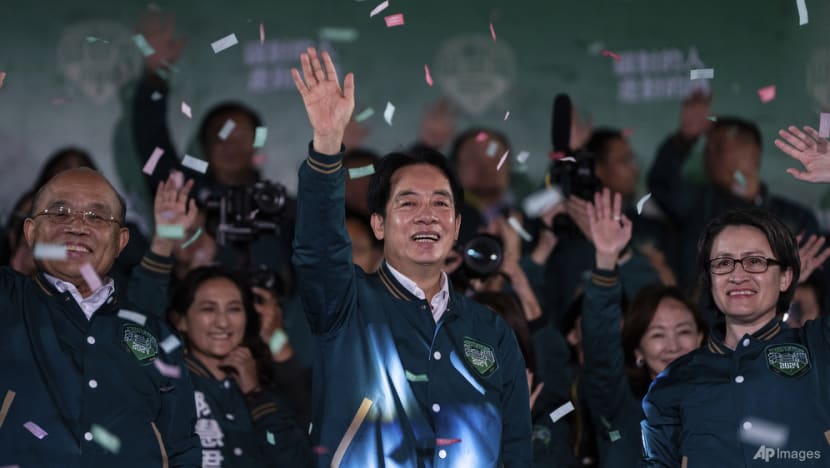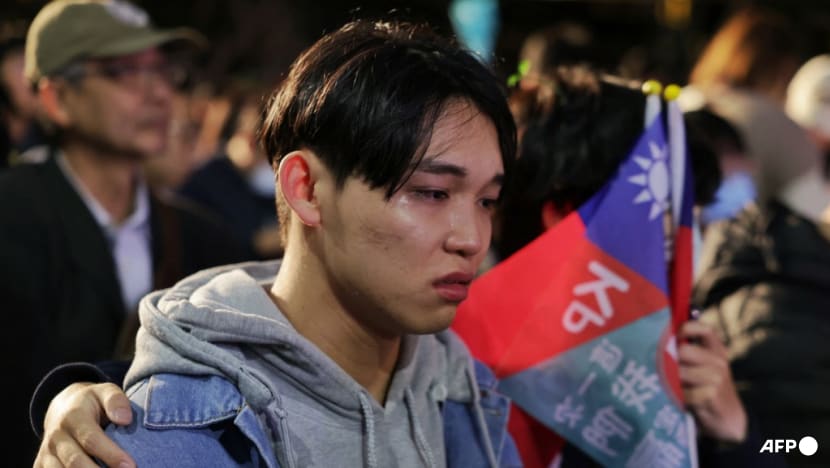Taiwan's president-elect William Lai seeks dialogue with China, extends olive branch to rivals
The vice-president’s victory at the presidential polls marks a historic leadership transition within the independence-leaning Democratic Progressive Party, with the election outcome set to heighten tensions with Beijing.

William Lai Ching-te (centre) celebrates his victory in Taiwan's presidential election with running mate Hsiao Bi-khim (right) in Taipei on Jan 13, 2024. (Photo: AP/Louise Delmotte)

This audio is generated by an AI tool.
TAIPEI: An olive branch extended to the opposition and also to China – that was what Taiwan's newly elected leader William Lai Ching-te did in his first remarks after securing the presidency for the independence-leaning Democratic Progressive Party (DPP) on Saturday (Jan 13).
In his victory speech delivered at a press conference at 8.30pm, he said: "Under the principles of dignity and parity, we will use exchanges to replace obstructionism, dialogue to replace confrontation, and confidently pursue exchanges and cooperation with China.
"This furthers the wellbeing of people on both sides of the Taiwan Strait and achieves our objective of peace and common prosperity."
Mr Lai won 40.05 per cent of the vote, comfortably ahead of the Kuomintang's (KMT) Mr Hou Yu-ih with 33.49 per cent and the Taiwan People's Party's (TPP) Dr Ko Wen-je with 26.46 per cent, according to the Central Election Commission.
Mr Lai, the former mayor of Tainan, is a noted proponent of Taiwan’s independence. His rivals and critics have said his election would endanger Taiwan and threaten peace with China.
But his win was not a surprise, given that the vice-president, 64, had led in opinion polls months before Polling Day.
His rivals conceded defeat a mere four hours after voting closed, but Mr Lai could face an uphill battle ahead with the DPP losing its legislative majority.
The KMT secured the most legislative seats – 52 out of 113 – but fell short of a majority. The DPP won 51 seats and the TPP won eight seats. Two seats were won by independent candidates.
This means that while the DPP’s win marks the first time a party has won a third consecutive term since direct presidential elections began in Taiwan in 1996, Mr Lai will have to govern with a hung parliament that could make it more difficult to push through new laws.
He said he had accepted his rivals’ congratulatory phone calls, and in turn congratulated them for increasing their seats in the legislature.
Acknowledging the DPP's poorer performance in the legislative elections, Mr Lai said in his speech that it "means that we did not work hard enough, and there are areas where we must humbly review and look back on".
"The elections have told us that the people expect an effective government, as well as strong checks and balances. We fully understand and respect these opinions from the public," he added.
He also pledged to carefully study the policies and positions of his two rival candidates, "as long as they bring benefit to the people and further our national development, they will be incorporated into my policy framework".
Other promises he made include tapping talent from different political parties for personnel appointments, prioritising issues that have consensus between political parties and increasing public participation on major, urgent issues such as energy transition.
Mr Lai succeeds outgoing president Tsai Ing-wen, who cannot run for re-election after serving two consecutive terms.
At the KMT’s campaign headquarters, Mr Hou bowed in apology to his supporters. “I feel that my efforts were not enough,” he said.
“The KMT was united from top to bottom, with unprecedented unity across different classes and counties. Unfortunately, we couldn’t achieve a change in government.”
Dr Ko told TPP supporters, some of whom were crying, not to see the result as a defeat in his concession speech.
"We have no reason to give up. Tomorrow morning, we will still come to work at 7.30am," he said.
"You can be depressed tonight, but remember to cheer up tomorrow, because we have to continue to work hard for our future. We only have one Taiwan."

Related:
VOTERS PESSIMISTIC
The next president’s job will not be made easier by the results of the legislative election, which has produced a hung parliament for the first time since 2008.
A divided house could stall the passage of key laws, such as expenditure to buy arms from the United States and election promises for labour pension reform and housing access.
After the results, some voters told CNA they were worried that with three parties contesting for influence in the legislature, it would be harder for the DPP to govern over the next four years.
"I feel the results are acceptable but not very satisfactory. Like I scored 75 points on a test but made many errors," said Taipei voter Mr Lee Guan-der, 31.
Project manager Chen Chen-en, 30, who works in Taichung, said that the issue he was most concerned about was national security.
He was worried that the government's national defence budget would not be able to pass without a parliamentary majority for the ruling party.
"I feel more pessimistic," he said. "I think things will not go as smoothly as they have in these past four years."
A 52-year-old business owner, who only wanted to be known as Linda, said she did not see any hope for Taiwan from the results.
“Many policy decisions do not take small- and medium-sized enterprises like ours into account. The economy has been so bad recently and costs have continued to grow, which puts a lot of pressure on us,” she said.
"It comes back to the feeling of not being able to see the future. It will only get worse and worse, more and more corruption."
Voter turnout in this election was 71.86 per cent, the second-lowest showing since direct presidential elections started in 1996.
Voting is not compulsory in Taiwan, and the voting age is 20. Of the nearly 20 million eligible voters, more than one million are first-timers.
Related:
WHAT LAI’S VICTORY MEANS
The DPP maintains that Taiwan is effectively independent, while China claims the island as its own. China cut off formal dialogue with Taiwan when Ms Tsai was elected in 2016.
While Mr Lai has said he is open to resuming dialogue, this is considered unlikely to happen.
Beijing regards Mr Lai as a separatist, and has warned Taiwanese voters of the “extreme danger” he poses to triggering cross-strait conflict.
On the campaign trail, Mr Lai and running mate Ms Hsiao Bi-khim, 52, pledged to uphold the status quo.
They stressed continuity with President Tsai, who is also disliked by Beijing but has never provoked it by pushing for formal independence.
Upholding the status quo is reflective of the Taiwanese public’s wishes, analysts told CNA.
Mr Lai is expected to continue President Tsai’s “relatively moderate” approach on China, but without cross-strait dialogue, the risk of misunderstanding and instability remains, they said.
Mr Lai will be inaugurated on May 20.
Until then, Beijing could dial up pressure, perhaps through more economic restrictions, to dissuade Mr Lai from making radical statements as his term begins, said China studies expert Hoo Tiang Boon of Nanyang Technological University in Singapore.
And with the DPP losing 10 seats in the legislative elections – from 61 to 51 seats – the stage is set for even more contestation in Taiwan’s politics.
On matters like the budget, defence policies and, in particular, the making of new laws, the opposition KMT and TPP will be able to block new initiatives proposed by the DPP, said Associate Professor Hoo.
“In terms of a lot of the new domestic policies… it will be difficult for William to actually push through unless he can find some kind of compromises with the KMT and, to some extent, TPP,” he said.
























